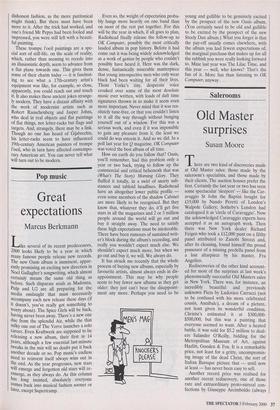Pop music
Great expectations
Marcus Berkrnann
Like several of its recent predecessors, 2000 looks likely to be a year in which many famous people release new records. The new Oasis album is imminent, appar- ently promising an exciting new direction in Noel Gallagher's songwriting, which almost certainlY means the same old thing as before. Such disparate souls as Madonna, Pulp and U2 are all preparing for the media onslaught that must necessarily accompany each new release these days (if it doesn't, you've really got something to worry about). The Spice Girls will be back, having never been away. There's a new one due from the splendid Air, while the thin sulky one out of The Verve launches a solo career. Even ICraftwerk are supposed to be releasing a new album, their first in 14 Years, although a few essential last-minute tweaks in the mix will no doubt put it back another decade or so. Pop music's endless need to reinvent itself always wins out in the end. As the year progresses, new stars Will emerge and forgotten old stars will re- emerge, as they always do. As this column has long insisted, absolutely everyone comes back into musical fashion sooner or later, except Supertramp. Even so, the weight of expectation proba- bly hangs more heavily on one band than on most of the rest put together. For this will be the year in which, if all goes to plan, Radiohead finally release the follow-up to OK Computer, possibly the most critically lauded album in pop history. Before it had come out it was being widely acknowledged as a work of genius by people who couldn't possibly have heard it. Here was the dark, dense, fantastically miserable masterpiece that young introspective men who only wear black had been waiting for all their lives. Thom Yorke's tiny, desperate voice croaked over some of the most desolate music ever written, with loads of daft time signatures thrown in to make it seem even more important. Never mind that it was res- olutely tune-free, or that you couldn't listen to it all the way through without bunging yourself out of a window. For this was a serious work, and even if it was impossible to gain any pleasure from it, the least we could do was esteem it. And so we did. In a poll last year for Q magazine, OK Computer was voted the best album of all time.
How on earth do you follow that? Oasis, you'll remember, had this problem only a year or two back, trying to follow up the commercial and critical behemoth that was (What's The Story) Morning Glory. They fluffed it totally, in a swirl of snorty sub- stances and tabloid headlines. Radiohead have an altogether lower public profile — even some members of the shadow Cabinet are more likely to be recognised. But they know that, whatever they do, it'll get five stars in all the magazines and 2 or 3 million people around the world will go out and buy it straight away. The need to satisfy these high expectations must be intolerable. There have been rumours of sustained writ- er's block during the album's recording, and really you wouldn't expect much else. We shouldn't expect much more, but when we go out and buy it, we will. We always do.
It has struck me recently that the whole process of buying new albums, especially by favourite artists, almost always ends in dis- appointment. This may be why people seem to buy fewer new albums as they get older: they just can't bear the disappoint- ment any more. Perhaps you need to be young and gullible to be genuinely excited by the prospect of the new Oasis album. (You certainly need to be old and gullible to be excited by the prospect of the new Steely Dan album.) What you forget is that the pay-off usually comes elsewhere, with the album you had fewest expectations of, the marginal purchase that makes up for all the rubbish you were really looking forward to. Mine last year was The Lilac Time, and this year — well, who knows? That's the fun of it. More fun than listening to OK Computer, anyway . . .


























































 Previous page
Previous page